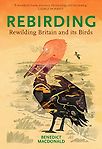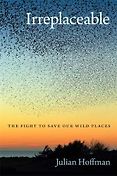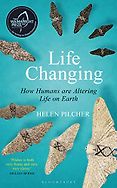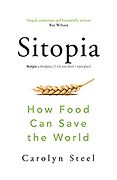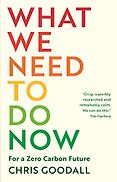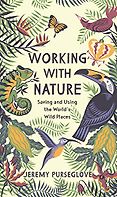This year, there are two Wainwright Prize shortlists, one focused on nature writing, and the second – which we’ll be discussing today – which seeks to highlight the best books on global conservation. You are the chair of the judging panel; what criteria have you used to select the best conservation books for the 2020 prize?
The best books further debate, increase the necessity for action, raise the profile of conservation issues, and address some of the real problems of climate change. Plus – as if that weren’t demanding enough – they should have literary quality, dexterity, and be entertaining. That’s what we’re looking for. And, actually, all the books on the shortlist achieve all of that, which is why I’m not hugely looking forward to the final judging meeting.
Because of lockdown we did have to read quite a few of them on PDF. And, frankly, if I can read a book on a computer and still like it, then that’s a complete achievement.
Agreed! So the 2020 conservation shortlist comprises six books. Let’s work our way through them, beginning with Irreplaceable: The Fight to Save Our Wild Places by Julian Hoffman.
The concept of this book is, I suppose, relatively simple, in that he goes to places that we may or may not be about to lose, and talks about the whys and wherefores. Which makes it sound quite boring, doesn’t it? Which it really and absolutely isn’t!
“You could sit quite happily on a beach and read some of these, because they’re really well-written, clever, and in some cases lyrical books”
I thought this was a wonderful book. It’s beautifully written. And it’s quite sobering as well, in that he goes to beautiful and exotic-sounding places around the world – but also places that are sort of… just slightly above bog-standard countryside, if you see what I mean, and explains, through the people who live and work in them, why these places matter so much. There’s a really strong sense in this book of the importance of place to humans, which perhaps we don’t talk about enough.
It’s sobering. But I think it’s a hopeful book – defiant, and full of life and love. It’s a lovely book.
One of the things that strikes me, while thinking about this book, is that it talks about places that might not obviously be ecologically valuable – but are. When it comes down to it, are there any places suitable for development? Or does nature always lose out?
Well, you could ask ten people that very same question and get ten different opinions. I think what Julian Hoffman would say – having never met the man – is that there are some places that we really need to fight to save. And there are other places, although he doesn’t talk about them, you could stand to lose.
I think, you know, all of the books have a strong message about being quite realistic about where we are and what we have to do – inconvenient, expensive and hard work as it might be. Rather than just thinking, ‘we’ll shove it over there, because there’s nothing else there.’ Because, actually, there’s an awful lot of stuff there.
I suppose all the books on this list are looking very carefully at the crossover between humans and the rest of the world. And perhaps none more so than in the second book, Life Changing: How Humans Are Altering Life on Earth by Helen Pilcher. It’s all about how the actions of humans have shaped the DNA of other life on Earth.
Yes, our impact on this world, the way we have changed the world. This is really interesting. She talks about her genetically-modified wolf, her domesticated wolf – which is her dog. And you think: ‘oh yeah!’
Get the weekly Five Books newsletter
She goes right back to the invention of farming, and how that changed everything. I learned almost an embarrassing amount from this book, given what I do for a living. Pilcher has a really light touch as well.
Pilcher is a comedian – with a doctorate in cell biology. Which strikes me as a rare combination.
It could be boring, this kind of book, but it’s actually really funny. It has really wry comments that just make you laugh, while discussing the huge impact of what she describes as “a bolshy bi-pedal primate.”
We, both purposely and unintentionally, have sewn ourselves into the fabric of the other lifeforms around us.
Exactly. The law of unintended consequences runs through this book, in that I’m sure when people started doing whatever they started doing, they didn’t think about the knock-on effects. That’s a theme running through it. But, again, it doesn’t say, ‘abandon hope.’ We’ve been clever enough to do all of this; we should be clever enough to sort out some of the problems we’ve created. She’s optimistic that this bolshy primate will be able to find a way out.
Let’s move onto book three on the 2020 conservation shortlist, Rebirding: Rewilding Britain and Its Birds, by Benedict Macdonald.
There’s a quote on the back of this book from Bill Oddie: “Having read a number of the recent books about rewilding, I was tempted to think, oh blimey, not another one!” I completely agree with Bill Oddie; when I picked this up, I thought, ‘I can’t be bothered to read this.’ But I’m really glad I did. Not only is it beautifully written and a joy to read, it’s really interesting, just a really good book. He writes absolutely beautifully, and although there’s loads of detail in it, it doesn’t feel like you’re being lectured.
“We should be clever enough to sort out the problems we’ve created”
Again, he goes back to really quite a long time ago to talk about how we got here, but then has very particular and practical ways that he thinks should improve things, particularly for birds, which is his thing. So it’s problems and solutions not only for birds, but also for rural communities.
He addresses the outsize influence of a number of agricultural practices, like sheep farming, and grouse moors.
Not everyone will agree with the conclusions that he reaches for, but his arguments are persuasively written, so at least there’s something to discuss. We can all say, ‘Oh dear, isn’t it awful? How dreadful.’ But at least if somebody says, ‘well, why don’t we do this?’ then you can have a discussion about it. He’s got some wonderful, detailed thoughts about how you can go about improving things.
Would you describe it as a polemic?
No. It doesn’t read like a polemic, because it’s very inviting. You don’t feel like you’re being shouted at. Or, well, maybe. It’s good. Yes, it’s clever. You don’t have to agree with him to find the book interesting.
Fantastic. Let’s move onto Carolyn Steel’s Sitopia: How Food Can Save the World.
Okay. So, again, another seemingly simple idea: let’s look at things through food. Now, I’m obsessed with food. I like cooking. I love eating. And this is really, really interesting, very wide-ranging. It looks at the world through the prism of food, covering everything from land use to philosophy, culture, and many contemporary issues like, for example, obesity. A lot of information, from a writer whose sense of humour comes through. Thank god. Because, again, in this book there are times when you think, ‘hang on a minute,’ and you have to go back and have another think about what she’s just told you. But it’s got a smile on, as well as a slightly annoyed tone.
On the face of it, this is a book about food. Could you explain how that relates to conservation?
Well, food governs everything, doesn’t it? I’m going to put this quite crudely, with apologies to Carolyn Steel who does this much better, but what you buy dictates how land is used – how intensively it’s used, what it’s used for and where that land is. Do you buy something that was grown here? Do you buy something that was grown far away? Your decisions about food influence so many things. So it really impacts on conservation.
Five Books interviews are expensive to produce. If you're enjoying this interview, please support us by donating a small amount.
Food is a problem in many ways for us at the moment – it makes us fat and unhealthy. But the way some of it is grown, particularly in Western societies, can fuel climate change.
This is food as ethics.
As everything! Even as someone who works in farming and food, this book makes you realise how food cuts across everything. It has really interesting things about the philosophy of food, and how other civilisations looked at food. I found it such an interesting book.
We’re shifting, in book five on our 2020 shortlist of the best conservation books, to questions of climate change more explicitly. This is Chris Goodall’s What We Need To Do Now.
So this is quite a different book to all the others, because it pretty much says, ‘right, these are the problems, here are my solutions.’ It’s very clear, and gives you ten areas for action. It’s a manifesto for change and how to do it.
Again, it’s readable, it doesn’t feel like a lecture. Not everyone is going to agree with all the solutions that Chris thinks we should all do, but he does break it down in a way that makes all the challenges doable, rather that making us feel that it’s all so dreadful that there’s nothing we can do. This book is like, ‘no, we can do this, this, this.’ Even if you disagree, it shows there is a way through.
“if you say to people, ‘you’ve got to read this book because it’s good for you,’…I’d be the first one leading the charge out the door ”
I think it’s interesting that one of his priorities in the book is insulating houses, which was part of the British government’s green recovery plan, announced just a few weeks ago. It gave me massive boasting rights because I knew everything, having just read this chapter. It’s really interesting and it’s nice to have something that says, ‘this is how we should make it work.’ Again, even if there’s disagreement, you’ll have a conversation.
I’m getting the sense, from the way you talk about these books, of conservation as dialogue – something we might not know the answers to yet, but something that we need to find the way forward with, and soon.
Well, Chris Goodall would say that we definitely do know, and we just need to get on with it. That’s what Chris Goodall would like. For many of the rest of us, it’s just: ‘show me what I need to do, and I’ll do it.’ But as someone who wants to learn… You know, one of the reasons I wanted to judge this prize was that I thought the books would teach me things I didn’t know. And they really have. I think reading them has made me change some of my views. It has certainly changed me and inspired me, reading these books.
We’ve got one left on the conservation books shortlist for 2020, which is Working With Nature by Jeremy Purseglove.
This is a game changer. I mean, this book has been a lifetime in the making, because Jeremy has had such an amazing life. It’s global in outlook, because his career has been all over the world. He says, ‘I was in so-and-so, and this is how it works there.’ I had no idea that place even existed, let alone that that’s how it works! Also, he’s worked alongside engineers, so it’s all about solutions. Here’s a problem: let’s work it out.
What’s really lovely about it is that it’s his professional lifetime – in fact, it starts from when he was a small child. It has that feel of time – the way your experience shapes you and your attitudes.
He wrote quite a well-known book in the 1980s called Taming the Flood, which was about wetlands and their potential, from his perspective as both a landscape architect and an ecologist.
That’s right.
So when he says ‘working with nature’ he means harnessing nature for our own ends, working alongside it?
Yes. He would try to work with the local community to find a solution that got whatever result you wanted, engineering-wise, but preserved what you could and was also respectful of the way people traditionally used that area. So, as an environmentalist and ecologist, he’s worked on massive projects. And because he’s done it over a long time, it’s interesting to see what you can achieve when you actually talk to people, and with patience.
Yes. What you had to say about this book, and Hoffman’s Irreplaceable too, reminded me of what John Muir said: “Not blind opposition to progress, but opposition to blind progress.”
Exactly. And, even in the Chris Goodall book, which is very much ‘here’s the problem, here’s the solution,’ the solution is not: ‘so let’s all go live in a mud hut,’ you know? It’s: ‘let’s do something different.’ ‘Let’s have a carbon tax’, or, ‘let’s use more electric cars.’ Let’s do it like this, you know? Sometimes not very glamorous things. It’s not a rallying cry, is it? ‘Insulate your house!’ But actually it’s really important, because of the scale.
A little bit like how Irreplaceable is not talking about the most beautiful national park in the history of the world, it’s about saving that little patch of green that’s really important to the thousand people who live within five minutes’ walk.
Finally – and you touched on this earlier, when you spoke of how much you’d learned from reading the submissions – what do you think is the value of reading conservation books? Is it a moral imperative that we should be more informed?
No, no, no! I think if you say to people, ‘you’ve got to read this book because it’s good for you,’ then, I mean, I’d be the first one leading the charge out the door! These are all a good read. You could sit quite happily on a beach and read some of these. Because they’re really well-written, clever, and in some cases lyrical books. And what they’re doing is challenging us to think differently and to get off our backsides and do something.
The winner will be announced on September 8th, 2020. wainwrightprize.com
Interview by Cal Flyn, Deputy Editor
August 26, 2020
Five Books aims to keep its book recommendations and interviews up to date. If you are the interviewee and would like to update your choice of books (or even just what you say about them) please email us at [email protected]

